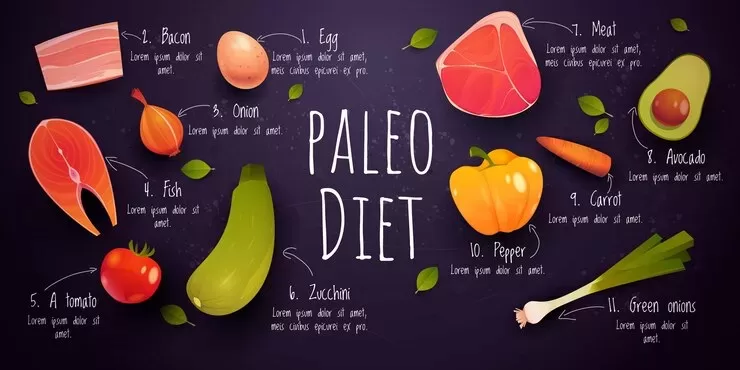Are you curious about the Paleo diet? This ancient eating plan, inspired by the diets of our hunter-gatherer ancestors, has gained immense popularity in recent years. But is it all it’s cracked up to be?
In this article, we’ll delve into the truth about the Paleo diet, exploring its benefits and key guidelines. Whether you’re considering adopting the Paleo diet or simply curious about its principles, this comprehensive guide will provide you with all the information you need.
Beyond the Meat Myth
Contrary to popular belief, the Paleo Diet is not exclusively meat-based. In fact, it prioritizes a significant intake of fruits, vegetables, and other plant-based foods. This balanced approach ensures a diverse range of nutrients, crucial for maintaining a healthy gut microbiome.
Recent studies have highlighted the importance of plant-based foods in gut health. The fiber and polyphenols found in fruits, vegetables, and whole grains provide a nourishing environment for beneficial gut bacteria. These compounds can also help reduce inflammation, a key factor in digestive disorders.
Macronutrient Flexibility
One of the Paleo Diet’s strengths is its flexibility when it comes to macronutrients. Unlike restrictive diets that dictate specific ratios of carbohydrates, proteins, and fats, the Paleo approach encourages a more intuitive eating style. This flexibility can:
- Promote sustainability: Adapt to individual needs and preferences, making it easier to stick to long-term.
- Reduce stress around food: Avoids rigid rules and fosters a healthier relationship with food.
- Encourage nutrient diversity: Allows for a wider variety of foods, supporting a balanced gut microbiome.
By prioritizing whole, unprocessed foods, the Paleo Diet empowers individuals to make informed choices that align with their unique dietary needs and preferences.
Nutritional Richness
The Paleo Diet is renowned for its nutritional density, often surpassing other dietary approaches in terms of vitamin and mineral content. This richness stems from its emphasis on whole, unprocessed foods, such as:
- Leafy greens: Packed with vitamins, minerals, and antioxidants.
- Nuts and seeds: Rich in healthy fats, fiber, and plant-based protein.
- Lean proteins: Provide essential amino acids for tissue repair and growth.
These nutrient-dense foods not only support overall health but also possess anti-inflammatory properties that can help:
- Prevent diseases: Reduce the risk of chronic conditions like heart disease and diabetes.
- Improve gut health: Reduce inflammation and support a balanced microbiome.
By prioritizing whole, unprocessed foods, the Paleo Diet offers a nutritionally robust approach that can contribute to optimal health and well-being.

Scientific Support for Disease Prevention
Numerous studies have demonstrated the Paleo Diet’s effectiveness in preventing diseases and reducing inflammation, both of which are closely tied to gut health. By eliminating processed foods, sugars, and grains, the Paleo Diet helps to:
- Reduce the risk of chronic diseases: Studies published in the New England Journal of Medicine and the Lancet have linked the Paleo Diet to lower rates of obesity, diabetes, and cardiovascular disease.
- Mitigate inflammation: Research from institutions like the Mayo Clinic and Harvard Medical School has shown that the Paleo Diet’s focus on whole, unprocessed foods can help reduce inflammation, a key factor in digestive disorders.
The Paleo Diet’s ability to support overall health and well-being is backed by a growing body of scientific evidence. By adopting a Paleo-inspired lifestyle, individuals can take proactive steps to improve their gut health and reduce their risk of chronic diseases.
Benefits of the 8-Week Self-Paced Gut Healing Program
Our 8-Week Self-Paced Gut Healing Program provides a comprehensive framework for restoring your digestive health and promoting overall well-being. This carefully designed program offers the following benefits:
- Personalized Guidance: Tailored to your individual needs and pace, ensuring optimal results.
- Step-by-Step Approach: Easy-to-follow guidelines for gradual, effective healing.
- Holistic Focus: Addresses both dietary and lifestyle factors for comprehensive gut health.
- Expert Support: Access to expert advice and resources throughout the program.
- Sustainable Results: Develop long-lasting healthy habits for ongoing digestive health.
By investing in this program, you’re taking a proactive step towards a healthier, happier you.
The Paleo Diet offers a comprehensive approach to eating that extends beyond mere weight management. By embracing the Paleo Diet, individuals can take a proactive step towards improved digestive health and a higher quality of life.

FAQs
What is good about paleo?
The Paleo diet is often associated with benefits like weight loss, improved blood sugar control, and better heart health. However, the scientific evidence supporting these claims is mixed.
What is the main idea behind the paleo diet?
The Paleo diet is based on the idea that humans should eat foods similar to those consumed by our hunter-gatherer ancestors. This means avoiding processed foods, grains, legumes, and dairy, and focusing on lean meats, fish, fruits, vegetables, and nuts.
Is paleo diet historically accurate?
The Paleo diet’s historical accuracy is debated. While some argue that it closely resembles the diets of early humans, others point out that the diets of our ancestors varied widely depending on their location and environment.
What does it mean to be paleo friendly?
A Paleo-friendly diet emphasizes whole, unprocessed foods and avoids modern dietary staples like grains and dairy. However, it can be flexible and accommodate different preferences and dietary needs.




